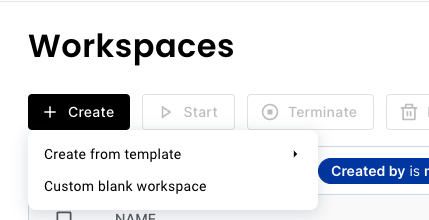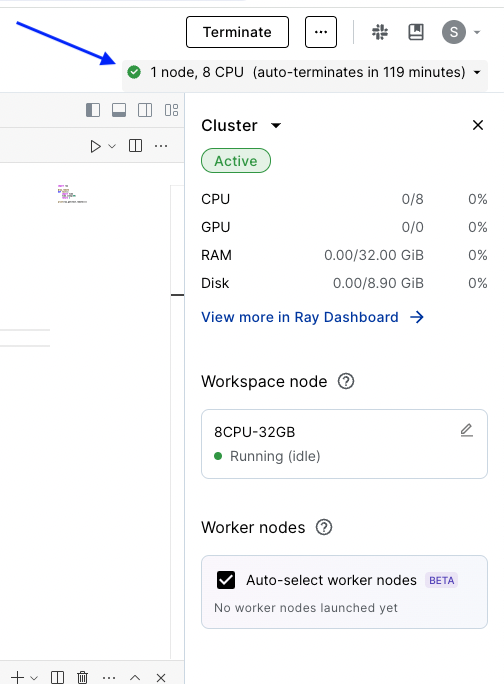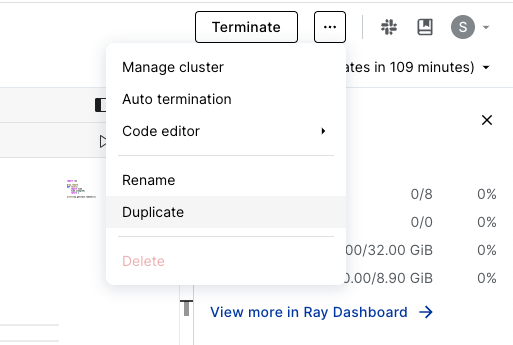Manage workspaces
Manage workspaces
This page provides an overview of creating and managing Anyscale workspaces.
Create a workspace
To create a blank workspace, go to the Workspaces page and select Create and Custom blank workspace.

Creating a blank workspace gives you the option to configure all the workspace settings prior to starting. See Define a Ray cluster.
You can also create a workspace from a template on the home page. These templates include a code sample and the suggested compute and environment configurations by Anyscale. You can customize these examples with your own code and settings. See the Anyscale templates gallery.
Idle termination
Anyscale terminates a workspace after a period of inactivity by default. The following actions count as activities:
- A running Ray job is an ongoing activity for its duration.
- Completing or canceling a command submitted through any terminal (web terminal, VS Code). A submitted command doesn't count as an activity until it finishes.
- Making a change to the filesystem of an Anyscale workspace.
- A change made by code running in the workspace only counts as activity if it causes a new workspace snapshot. In other words, the change affects a file tracked by Git.
To turn off automatic idle termination, select Auto termination from the dropdown next to Terminate in a workspace. Here, you can edit idle termination and maximum uptime settings.
Running a notebook doesn't automatically count as activity. However, when running ray.init() inside a notebook or attaching a Ray Driver, the workspace remains active unless it's explicitly stopped with ray.shutdown() or exceeds the maximum uptime configured.
Modify the container image and dependencies
Use the Dependencies tab to complete the following tasks:
- Change the container image used by your workspace. See What is a container image?.
- Use containerfile syntax to build a custom image for your workspace. See Iterate on workspace container images.
- Add Pip packages or Environment variables to your workspace for use in the cluster-wide runtime environment. See Runtime environments on Anyscale.
Anyscale automatically tracks pip packages installed on a workspace when running pip install PACKAGE_NAME on any terminal.
Update the compute configuration
You can change the compute configuration of a workspace in the Anyscale console, CLI, or SDK.
- Anyscale console
- CLI
- SDK
Click on the workspace status in the right top corner to open the cluster panel. In this panel, you can change the compute configuration of the workspace and monitor the status of the cluster. See Modify and save a compute config for a workspace.

Use the CLI to update the workspace compute config with the following command:
anyscale workspace_v2 update <workspace-id> --compute-config <compute-config-name>
For more options, see anyscale workspace_v2 update.
Use the SDK to update the workspace with the following code:
import anyscale
from anyscale.workspace.models import UpdateWorkspaceConfig
anyscale.workspace.update(
id="<workspace-id>",
config=UpdateWorkspaceConfig(compute_config="<compute-config-name>"),
)
For more options, see anyscale.workspace.update.
Duplicate a workspace
Duplicate a workspace to create a new workspace from the current state of an existing one. This includes the following:
- Code
- Compute config
- Dependencies
This operation doesn't duplicate cluster storage. See Shared storage on Anyscale.

Customize your workspace shell
Use the ~/.workspacerc file to customize the terminal in your Anyscale workspace.
Anyscale overrides any changes you make to a ~/.bashrc file when you restart your workspace. Anyscale sources the ~/.workspacerc file after the ~/.bashrc file, allowing you to customize your shell and persist these changes across workspace restarts.
This file lives outside of the working_dir for your workspace, so isn't included in downloads or custom templates created from your workspace.